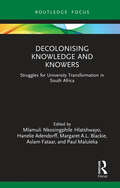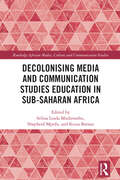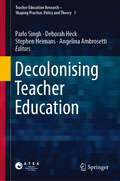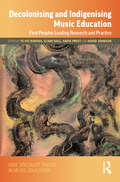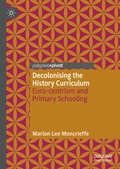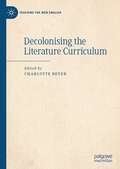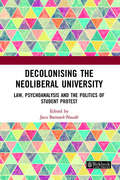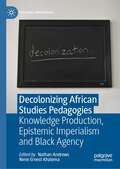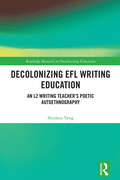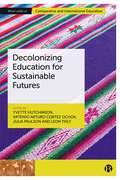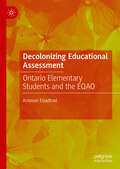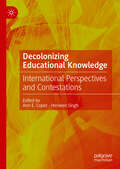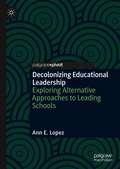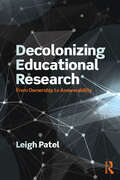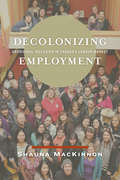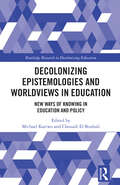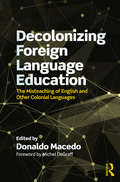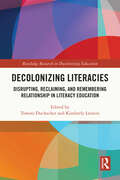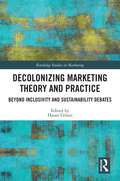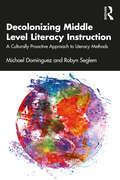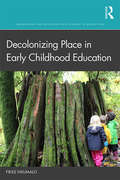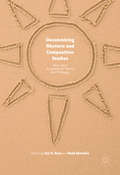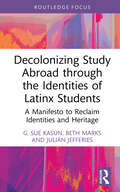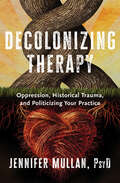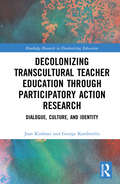- Table View
- List View
Decolonising Knowledge and Knowers: Struggles for University Transformation in South Africa (Legitimation Code Theory)
by Mlamuli Nkosingphile Hlatshwayo Hanelie Adendorff Margaret A.L. Blackie Aslam Fataar Paul MalulekaDecolonising Knowledge and Knowers contributes to the current struggles for decolonising education in the global South, focusing on the highly illuminating case of South African higher education. Galvanised by #FeesMustFall and #RhodesMustFall student protests, South Africa has seen particularly intense and broad social engagement with debates over decolonising universities. However, much of this debate has been consumed with definitions and meanings. In contrast, Decolonising Knowledge and Knowers shows how conceptual tools, specifically from Legitimation Code Theory, can be enacted in research and teaching to meaningfully work towards productive decolonisation. Each chapter addresses a key issue in contemporary debates in South African higher education and show how practices concerning knowledge and knowers are playing a role, drawing on quantitative and qualitative research, praxis, and interdisciplinary research.
Decolonising Media and Communication Studies Education in Sub-Saharan Africa (Routledge African Media, Culture and Communication Studies)
by Shepherd Mpofu Selina Linda Mudavanhu Kezia BatisaiThe book provides insights on decolonising media and communication studies education from diverse African scholars at different stages of their careers. These academics, located on the continent and in the diaspora, share an interest in decolonising higher education broadly and media and communication studies teaching and learning in particular. Although many African countries gained flag independence from different European colonial powers between the 1950s and the 1970s, this book argues that former colonies remain ensnared in a colonial power matrix. Many African universities did not jettison ways of teaching and learning established during colonialism, and even those journalism, communication, and media studies training programmes which were established after the attainment of flag independence did not place decolonial agendas at the front and centre when setting them up. Starting with big picture thematic questions around decolonisation, the book goes on to consider what the implications of change would be for students and instructors, before reflecting on how far it is possible to decolonise curricula and syllabi and what this might look like in practice across a range of subject areas and country contexts. Overall, this book presents a nuanced picture of what a decolonised media and communication studies education could look like in sub-Saharan Africa. This book is essential for researchers in Africa in disciplines such as media and communication studies, journalism, film studies, cultural studies, and higher education studies. More broadly, the concepts and ideas on decolonising teaching and learning discussed in the book are relevant to instructors in any discipline who are interested in doing the decolonial work of contesting coloniality.
Decolonising Teacher Education (Teacher Education Research – Shaping Practice, Policy and Theory #1)
by Angelina Ambrosetti Deborah Heck Parlo Singh Stephen HeimansThis book makes a deliberate attempt to explore the complexity of decolonising theories in teacher education. It draws attention to the historical and emerging impacts of colonialism on educational institutions and practices, challenging educators to expand their understanding of diverse trajectories of decolonial research both theoretically and practically. It adds to the discussions and dialogues between different disciplinary traditions, such as postcolonial and decolonial studies, as well as critical Indigenous and critical race studies. As an international compilation, it offers educators a unique opportunity to envision teacher education through alternative lenses—rethinking the relationship between ontology-epistemology-ethics, that is, what constitutes knowledge, how it is produced, and what material worlds are constructed in and through knowledge / research systems. Through compelling examples, this book illustrates how educators have navigated epistemic injustices within the field of teacher education amidst the rising global demands for standardisation. It encourages teacher educators to explore alternative theories within their own contexts, crafting new teacher education practices in universities and schools.
Decolonising and Indigenising Music Education: First Peoples Leading Research and Practice (ISME Series in Music Education)
by Te Oti Rakena, Clare Hall, Anita Prest and David JohnsonCentring the voices of Indigenous scholars at the intersection of music and education, this co-edited volume contributes to debates about current colonising music education research and practices, and offers alternative decolonising approaches that support music education imbued with Indigenous perspectives. This unique collection is far-ranging, with contributions from Chile, New Zealand, Australia, Canada, Malaysia, India, South Africa, Kenya, and Finland. The authors interrogate and theorise research methodologies, curricula, and practices related to the learning and teaching of music. Providing a meeting place for Indigenous voices and viewpoints from around the globe, this book highlights the imperative that Indigenisation must be Indigenous-led.The book promotes Indigenous scholars’ reconceptualisations of how music education is researched and practised, with an emphasis on the application of decolonial ways of being. The authors provocatively demonstrate the value of power-sharing and eroding the gaze of non-Indigenous populations. Pushing far beyond the concepts of Western aesthetics and world music, this vital collection of scholarship presents music in education as a social and political action, and shows how to enact Indigenising and decolonising practices in a wide range of music education contexts.
Decolonising the History Curriculum: Euro-centrism and Primary Schooling
by Marlon Lee MoncrieffeThis book calls for a reconceptualisation and decolonisation of the Key Stage 2 national history curriculum. The author applies a range of theories in his research with White-British primary school teachers to show how decolonising the history curriculum can generate new knowledge for all, in the face of imposed Eurocentric starting points for teaching and learning in history, and dominant white-cultural attitudes in primary school education. Through both narrative and biographical methodologies, the author presents how teaching and learning Black-British history in schools can be achieved, and centres his Black-British identity and minority-ethnic group experience alongside the immigrant Black-Jamaican perspective of his mother to support a framework of critical thinking of curriculum decolonisation. This book illustrates the potential of transformative thinking and action that can be employed as social justice for minority-ethnic group children who are marginalized in their educational development and learning by the dominant discourses of British history, national building and national identity.
Decolonising the Literature Curriculum (Teaching the New English)
by Charlotte BeyerThis book explores pedagogical approaches to decolonising the literature curriculum through a range of practical and theoretically-informed case studies. Although decolonising the curriculum has been widely discussed in the academe and the media, sustained examinations of pedagogies involved in decolonising the literature at university level are still lacking in English and related subjects. This book makes a crucial contribution to these evolving discussions, presenting current and critically engaged pedagogical scholarship on decolonising the literature curriculum. Offering a broad spectrum of accessible chapters authored by experienced national and international academics, the book is structured into two parts, Texts and Contexts, presenting case studies on decolonising the literature curriculum which range from the undergraduate classroom, university writing centres, through to the literary doctorate.
Decolonising the Neoliberal University: Law, Psychoanalysis and the Politics of Student Protest
by Jaco Barnard-NaudéTaking the postcolonial – or, more specifically, the post-apartheid – university as its focus, the book takes the violence and the trauma of the global neoliberal hegemony as its central point of reference. Following a primarily psychoanalytic line of enquiry, it engages a range of disciplines – law, philosophy, literature, gender studies, cultural studies and political economy – in order better to understand the conditions of possibility of an emancipatory, or decolonised, higher education. And this in the context of both the inter-generational transmission of the trauma of colonialism, on the one hand, and, on the other, the trauma of neoliberal subjectivity in the postcolonial university. Oriented around an important lecture by Jacqueline Rose, the volume contains contributions from world-renowned authors, such as Judith Butler and Achille Mbembe, as well as numerous legal and other theorists who share their concern with interrogating the contemporary crisis in higher education. This truly interdisciplinary collection will appeal to a wide range of readers right across the humanities, but especially those with substantial interests in the contemporary state of the university, as well as those with theoretical interests in postcolonialism, psychoanalysis, gender studies, cultural studies, jurisprudence and law.
Decolonizing African Studies Pedagogies: Knowledge Production, Epistemic Imperialism and Black Agency (Political Pedagogies)
by Nathan Andrews Nene Ernest KhalemaDespite the long history of decolonization as a ‘third world’ political project, decolonization as an intellectual project has gained tremendous momentum in recent times, signalled by movements such as #RhodesMustFall, #BlackInTheIvory, and Why Is My Curricula So White among others. These movements situate the coloniality of power within ongoing practices in academia and seek to disrupt systemic racism and oppressive structures of knowledge production and dissemination. Assembling critical perspectives of scholars engaged in African Studies and other cognate disciplines on the continent and in the diaspora, the book elucidates and fuses ideas together to produce nuanced pedagogical advances in the service of students, academics, and educators. It contributes ideas on how to navigate systems, curricula, and academic contexts that have perpetuated a colonial toxicity that undermines Black agency and epistemic justice. This book will be of interest to students, researchers, educational leaders and policy makers across diverse disciplines interested in championing a decolonial praxis in academic spaces and universities.
Decolonizing EFL Writing Education: An L2 Writing Teacher's Poetic Autoethnography (Routledge Research in Decolonizing Education)
by Shizhou YangArguably the first book-length exploration of decolonizing English as a Foreign Language (EFL) writing education, this novel volume uses poetic autoethnography to provide a situated, dynamic, and complex view of multilingual writers through their second language (L2) academic writing and creative writing.Responding to contemporary calls to decolonize L2 writing as a field and diversify academic writing for multilingual students, this book is the first of its kind to explore the decolonization of EFL writing education from a Global Southern context. Chapters critically and creatively consider issues of educational technologies, translanguaging, academic writing, epistemology, and pedagogy from two writing courses from a Global South and classroom writing ecology perspective. Using poetic autoethnography alongside data from authentic writing classrooms in Thailand, the book posits that emergent translanguaging literature can be cultivated for decolonization purposes, critiquing and providing decolonial options in such areas as monolingual ideology, freewriting, student identity, and mind.Empowering EFL writing teachers to raise students’ critical awareness of issues such as writing, culture, and coloniality, this book will be of key interest to researchers, scholars, and postgraduate students in the fields of applied linguistics, Teaching English to Speakers of Other Languages (TESOL), L2 writing, multilingual education, and language policy and planning.
Decolonizing Education for Sustainable Futures
by Yvette Hutchinson, Artemio Arturo Cortez Ochoa, Julia Paulson and Leon TiklyBringing together the perspectives of researchers, policy makers, activists, educators and practitioners, this book critically interrogates the Western-centric assumptions underpinning education and development agendas and the colonial legacies of violence they often uphold. The book considers the crucial connection between the idea of sustainable futures and the demand to decolonize education. Containing an innovative mixture of text, stories and poetry, it explores how decolonized futures can be conceived and enacted, offering theoretical and practical examples, including from practice in educational and cultural organizations. In doing so, the book highlights education’s potential role in facilitating processes of reparative justice that can contribute to decolonized futures.
Decolonizing Educational Assessment: Ontario Elementary Students and the EQAO
by Ardavan EizadiradThis book examines the history of standardized testing in Ontario leading to the current context and its impact on racialized identities, particularly on Grade 3 students, parents, and educators. Using a theoretical argument supplemented with statistical trends, the author illuminates how EQAO tests are culturally and racially biased and promote a Eurocentric curriculum and way of life privileging white students and those from higher socio-economic status. This book spurs readers to further question the use of EQAO standardized testing and challenges us to consider alternative models which serve the needs of all students.
Decolonizing Educational Knowledge: International Perspectives and Contestations
by Ann E. Lopez Herveen SinghThis volume explores theories and practices of decolonizing education, drawing on international perspectives from scholars across the globe to engage new knowledges and build solidarities across different spaces. Decolonization is an ongoing process in which educators, community members, and practitioners alike have a stake in challenging Eurocentric paradigms and ways of knowing. The book showcases the contributions of praxis-oriented scholars and practitioners who seek to engage in decolonizing praxis that unsettles educational norms, forging new ways of thinking about teaching, learning, and leadership.
Decolonizing Educational Leadership: Exploring Alternative Approaches to Leading Schools
by Ann E. LopezThis book offers new ways of engagement for leaders seeking to connect theory to practice in decolonizing education. In the current climate where xenophobia, anti-immigrant sentiments, and other forms of exclusion make up much of the discourse, educational leaders need to seek ways to foreground other forms of knowledge and transfer them into their daily leadership practices. Lopez contributes to other critical leadership approaches while foregrounding a decolonizing approach that unsettles the coloniality manifested in education and school practices. Chapters provide school leaders with examples of ways they can challenge coloniality, white supremacy, and other forms of oppression in schooling that negatively impact some students and their educational outcomes.
Decolonizing Educational Research: From Ownership to Answerability (Series in Critical Narrative)
by Leigh PatelDecolonizing Educational Research examines the ways through which coloniality manifests in contexts of knowledge and meaning making, specifically within educational research and formal schooling. Purposefully situated beyond popular deconstructionist theory and anthropocentric perspectives, the book investigates the longstanding traditions of oppression, racism, and white supremacy that are systemically reseated and reinforced by learning and social interaction. <P><P>Through these meaningful explorations into the unfixed and often interrupted narratives of culture, history, place, and identity, a bold, timely, and hopeful vision emerges to conceive of how research in secondary and higher education institutions might break free of colonial genealogies and their widespread complicities.
Decolonizing Employment: Aboriginal Inclusion in Canada's Labour Market
by Shauna MackinnonIndigenous North Americans continue to be overrepresented among those who are poor, unemployed, and with low levels of education. This has long been an issue of concern for Indigenous people and their allies and is now drawing the attention of government, business leaders, and others who know that this fast-growing population is a critical source of future labour. Shauna MacKinnon’s Decolonizing Employment: Aboriginal Inclusion in Canada’s Labour Market is a case study with lessons applicable to communities throughout North America. Her examination of Aboriginal labour market participation outlines the deeply damaging, intergenerational effects of colonial policies and describes how a neoliberal political economy serves to further exclude Indigenous North Americans. MacKinnon’s work demonstrates that a fundamental shift in policy is required. Long-term financial support for comprehensive, holistic education and training programs that integrate cultural reclamation and small supportive learning environments is needed if we are to improve social and economic outcomes and support the spiritual and emotional healing that Aboriginal learners tell us is of primary importance.
Decolonizing Epistemologies and Worldviews in Education: New Ways of Knowing in Education and Policy (Routledge Research in Decolonizing Education)
by Chouaib El Bouhali Michael KariwoThis edited volume examines the decolonization of worldviews and ways of knowing in education and educational policy. It critically challenges the Western interpretation of epistemology and ontology, providing a platform for contributors to demonstrate how concepts of decolonization, knowledge and worldviews are understood, as well as the impact of these understandings in creation of policies and practices in education and pedagogy. It also offers insight into related themes on student resilience, English language, the internationalization of western knowledge, indigenous paradigms, and curriculum transformation. Chapter authors present new understandings of decolonizing knowledge and diversity, analysis of non-Western and indigenous epistemologies and worldviews, and examples of implementation of equity in policy and education through case studies. Creating and initiating a platform for wider debate, it will ultimately appeal to scholars, researchers, policy makers and educational leaders concerned with decolonizing education and policy in North America and beyond, and with interests in indigenous education, decolonizing education, sociology of education, and philosophy of education.
Decolonizing Foreign Language Education: The Misteaching of English and Other Colonial Languages (Series in Critical Narrative)
by Donaldo MacedoDecolonizing Foreign Language Education interrogates current foreign language and second language education approaches that prioritize white, western thought. Edited by acclaimed critical theorist and linguist Donaldo Macedo, this volume includes cutting-edge work by a select group of critical language scholars working to rigorously challenge the marginalization of foreign language education and the displacement of indigenous and non-standard language varieties through the reification of colonial languages. Each chapter confronts the hold of colonialism and imperialism that inform and shape the relationship between foreign language education and literary studies by asserting that a critical approach to applied linguistics is just as important a tool for FL/ESL/EFL educators as literature or linguistic theory.
Decolonizing Literacies: Disrupting, Reclaiming, and Remembering Relationship in Literacy Education (Routledge Research in Decolonizing Education)
by Kimberly Lenters Towani DuchscherThis volume examines the ways in literacy has been used as a weapon and a means for settler colonialism, challenging colonized definitions of literacy and centring relationships as key to broadening understandings. It begins by confronting the multiple ways that settler colonialism has used literacy and definitions of literacy as a gatekeeper to participation in society. In response to settler colonialism’s violent acts of extraction, displacement, and replacement enacted upon the land, the resources, the people, and understandings of literacy, the editors propose a unique approach to decolonizing understandings of literacy through a triangulation of disruption, reclamation, and remembering relationships. This is enacted and explored through a range of diverse chapter contributions, written in the form of stories, poems, artworks, theatres, and essays, allowing the authentic voices of the authors to shine through, and opening up the English Language Arts as a space for engagement and interpretation with diverse, racialized understandings of literacy. Disrupting Eurocentric, colonized understandings that narrowly define literacy as reading and writing the colonial word, and advancing the movement to decolonize education, it will be of key interest to scholars, researchers, and educators with interest in literacy education, decolonizing education, anti-racist education, inclusive education, land-based literacy, and arts-based literacy.
Decolonizing Marketing Theory and Practice: Beyond Inclusivity and Sustainability Debates (Routledge Studies in Marketing)
by Hasan GilaniIn academic institutions worldwide, the call to decolonize the syllabus, curriculum, and the entire university experience is growing louder and more urgent. Yet, the conversation must extend beyond blogs, hashtags, and social media trends. This book dives deep into the critical need to challenge and transform the foundations of marketing education. Addressing the urgent need for deeper conversations, this book delves into the multifaceted process of decolonizing marketing theory and practice to foster a more inclusive field. Through an insightful collection of contributions, this book critically examines the entrenched roots of colonization, capitalism, and inequality, urging us to move beyond simply adding non-white authors and non-Western case studies to the curriculum. Decolonization should begin with a focus on inclusivity and equality, progressing towards the recognition and exploration of diverse contexts and paradigms.Through rigorous analysis and innovative perspectives, this book identifies key areas in marketing pedagogy that require decolonization, urging a move away from exclusionary practices and Western-centric ideologies. It identifies crucial areas where texts, knowledge, and contexts need to be decolonized, advocating for a paradigm shift from a culture of exclusion and Western-centric ideologies to one that embraces inclusivity and a broad range of philosophical perspectives from the non-Western world.Aimed at researchers and academics in the field of marketing, this book offers a profound exploration of teaching and learning dynamics from a more inclusive and diverse perspective. By fostering engagement with a wider audience, it seeks to enrich the discourse around marketing education with a more nuanced and enriched perspective. Decolonizing Marketing Theory and Practice is an essential resource for those committed to creating a more equitable and comprehensive understanding of marketing in a global context.
Decolonizing Middle Level Literacy Instruction: A Culturally Proactive Approach to Literacy Methods
by Michael Domínguez Robyn SeglemThis text offers pre-service and in-service teachers pragmatic strategies for teaching middle-grades literacy in culturally proactive and sustaining ways. By demystifying big ideas and complex concepts, Domínguez and Seglem provide clear pathways and lessons for illuminating and engaging with race, ethnicity, culture, and identity in the middle-grade English Language Arts classroom. While addressing social justice, equity, diversity, and liberation can seem intimidating or unrelated to classroom practice, the authors demonstrate how weaving such questions into instruction benefits students’ development. The guidance, strategies, and lessons in this book provide an answer to the question: What does decolonial literacy teaching look like? Concrete but not prescriptive, the authors encourage us to reconsider accepted logics of schooling, so that we can better support adolescents as they navigate complex identity landscapes. Bringing together disparate conversations around reading, writing, identity, and decolonial thinking, and specifically tailored to the middle grades, this book serves as a comprehensive toolkit for praxis and covers such topics as cultural change, community connections, and racial literacy. Each chapter features tips on reading and writing instruction, Teacher Spotlights, Planning Questions, and Additional Resources to make it easy for educators to apply the strategies to their own contexts. An accessible entry to addressing challenging questions around identity in the classroom, this book is essential reading in courses and professional development on ELA and literacy methods as well as teaching culturally and linguistically diverse students. For teachers looking to push toward equity and reshape literacy education so that it serves all middle-grade students, Domínguez and Seglem offer plenty of accessible and motivating places to start.
Decolonizing Place in Early Childhood Education (Indigenous and Decolonizing Studies in Education)
by Fikile NxumaloThis book draws attention to the urgent need for early childhood education to critically encounter and pedagogically respond to the entanglements of environmentally damaged places, anti-blackness, and settler colonial legacies. Drawing from the author’s multi-year participatory action research with educators and children in suburban settings, the book highlights Indigenous presences and land relations within ongoing settler colonialism as necessary, yet often ignored, aspects of environmental education. Chapters discuss topics such as: geotheorizing in a capitalist society, absences of Black place relations, and unsettling unquestioned Western assumptions about nature education. Rather than offer prescriptive solutions, this book works to broaden possibilities and bolster the conversation among teachers and scholars concerned with early years environmental education.
Decolonizing Rhetoric and Composition Studies: New Latinx Keywords for Theory and Pedagogy
by Iris D. Ruiz Raúl SánchezThis book brings together Latinx scholars in Rhetoric and Composition to discuss keywords that have been misused or appropriated by forces working against the interests of minority students. For example, in educational and political forums, rhetorics of identity and civil rights have been used to justify ideas and policies that reaffirm the myth of a normative US culture that is white, Eurocentric, and monolinguistically English. Such attempts amount to a project of neo-colonization, if we understand colonization to mean not only the taking of land but also the taking of culture, of which language is a crucial part. The editors introduce the concept of epistemic delinking and argue for its use in conceptualizing a kind of rhetorical and discursive decolonization, and contributors offer examples of this decolonization in action through detailed work on specific terms. Specifically, they draw on their training in rhetoric and on their own experiences as people of color to help reset the field's agenda. They also theorize new keywords to shed light on the great varieties of Latinx writing, rhetoric, and literacies that continue to emerge and circulate in the culture at large, in the hope that the field will feel more urgently the need to recognize, theorize, and teach the intersections of writing, pedagogy, and politics.
Decolonizing Study Abroad through the Identities of Latinx Students: A Manifesto to Reclaim Identities and Heritage (Routledge Research in Decolonizing Education)
by G. Sue Kasun Beth Marks Julián JefferiesThis book counters the common understanding of study abroad in Latin America as a White and middle-class colonizer practice and re-imagines it to fit the needs of Latinx immigrant/transnational higher education students. The book centers Latinx youth inhabiting familial heritage spaces as a pathway toward a deeper understanding of themselves as racialized and colonized individuals, reframing study abroad for Latinx youth as a way for them to reclaim, negotiate, and strengthen their own immigrant/Latino/a/Chicano/a and other identities. The text is undergirded by a theoretical argument based on decolonial methods in education and Critical Race Theory and draws on counter-stories, rich descriptive interviews, and participant observations across 26 years of combined experience leading educational trips to Latin America. The authors analyse, reflect, and critique the field of study abroad to advocate for the rethinking of recruitment strategies, pedagogical experiences, language practices, and community partnerships that include Latino/a, Chicano/a, and Latin American immigrant youth and their families from the beginning. They present a new conceptualization of Latinx immigrant students studying abroad as engaging opportunities for reclaiming heritage, culture, histories, and language, for exploring a sense of identity and obligation to Latin communities, and for healing from the effects on Whiteness and ethnocentrism in ways online possible outside the continental United States. As such, the book shifts the gaze of the entire field toward new diversities showcasing examples of how educational trips abroad can be re-envisioned to suit the needs of ethnically minoritized students in the United States. This volume will appeal to scholars, researchers, educators, and education officers working across higher education and international education, looking for contemporary, global. and forward-thinking decolonial methodologies.
Decolonizing Therapy: Oppression, Historical Trauma, and Politicizing Your Practice
by Jennifer MullanA call to action for therapists to politicize their practice through an emotional decolonial lens. An essential work that centers colonial and historical trauma in a framework for healing, Decolonizing Therapy illuminates that all therapy is—and always has been— inherently political. To better understand the mental health oppression and institutional violence that exists today, we must become familiar with the root of disembodiment from our histories, homelands, and healing practices. Only then will readers see how colonial, historical, and intergenerational legacies have always played a role in the treatment of mental health. This book is the emotional companion and guide to decolonization. It is an invitation for Eurocentrically trained clinicians to acknowledge privileged and oppressed parts while relearning what we thought we knew. Ignoring collective global trauma makes delivering effective therapy impossible; not knowing how to interrogate privilege (as a therapist, client, or both) makes healing elusive; and shying away from understanding how we as professionals may be participating in oppression is irresponsible.
Decolonizing Transcultural Teacher Education through Participatory Action Research: Dialogue, Culture, and Identity (Routledge Research in Decolonizing Education)
by George Kamberelis Jean KirshnerThis volume describes a Participatory Action Research (PAR) project involving educators from Belize and the U.S. to illustrate the critical role of shared dialogue in transnational teacher education. First identifying issues which inhibited the success of formerly didactic training delivered to Belizean teachers by U.S. educators, this volume documents the transformational impact of a shift to collaborative training approaches and uses first-person accounts from Belizean and U.S. stakeholders to illustrate their successes. Chapters powerfully illustrate that by engaging in Freirean-like dialogue and building relationships based on a mutual understanding of the cultural and historical context, as well as the identity of educators involved, partners are better able to engage in effective transnational pedagogical collaboration. Particular attention is paid to the importance of acknowledging the post-colonial setting and unique positionality of teachers in Belize. This text will benefit researchers, academics, and educators with an interest in action research and teacher research, multicultural education, and continued professional development in particular. Those interested in teacher training, education research, and international and comparative education will also benefit from this book.
